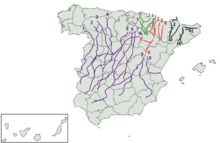Mesta
The Mesta (Spanish: Honrado Concejo de la Mesta, lit. 'Honorable Council of the Mesta') was a powerful guild of sheep ranchers in the Crown of Castile during the Middle Ages.

The sheep were transhumant, migrating from the pastures of Extremadura and Andalusia to León and Castile and back according to the season.
The borderlands (up to 100 km across) between the Christian kingdoms in the north of the Iberian Peninsula and al-Andalus in the south was too insecure for arable farming and was only exploited by shepherds. During the Reconquista farmers began to settle in the grazing lands, and disputes with pastoralists were common. The Mesta, set up in the late 13th century,[1] can be regarded as the first and most powerful agricultural union in medieval Europe.
The export of merino wool enriched the members of the Mesta (the nobility and religious orders) who had acquired ranches during the process of Reconquista. Two of the most important wool markets were held in Medina del Campo and Burgos.
The kings of Castile conceded many privileges to the Mesta. The cañadas (traditional rights-of-way for sheep) are legally protected in perpetuity from being built on or blocked. The most important cañadas were called cañadas reales, 'royal cañadas', because they were established by the king.
Some Madrid streets are still part of the cañada system, and there are groups of people who occasionally drive sheep across the modern city as a reminder of their ancient rights and cultures, although these days sheep are generally transported by rail.
Etymology

The name of the Mesta derived ultimately from the Latin: mixta, lit. 'mixed', referring to the common ownership of the guild's animals by multiple parties[2] among nobles and the Church. The bringing together of animals to assign their ownership (Klein, p. 9) became a meeting of shepherds. When the council was established, it was also called mesta.
By the late 15th century the Spanish: mestengo, (now spelled 'mesteño') referred to beasts of uncertain ownership distributed by the Mesta when found among the flocks.[3][4] In New Spain in colonial North America, feral horses came to be known as mesteños, from which is derived the English word mustang, used for the free-roaming horses of the modern Western United States.
Bibliography
- Julius Klein: The Mesta: A Study in Spanish Economic History 1273–1836. Harvard University Press, 1920
- McAlister, Lyle N. (1984). Spain & Portugal in the New World: 1492–1700. Minneapolis: University of Minnesota Press. pp. 19–21.
References
- Gerli, Michael (2003). Medieval Iberia: An Encyclopedia. Routledge. p. 563. ISBN 978-0-203-95364-8.
- "Mesta, n.". Oxford English Dictionary Online (3rd ed.). Oxford University Press. 2001.
- "Online Etymology Dictionary". EtymOnline.com. Archived from the original on June 5, 2015. Retrieved May 21, 2015.
- "mustang, n.". Oxford English Dictionary Online (3rd ed.). Oxford University Press. 2003.